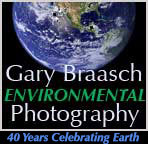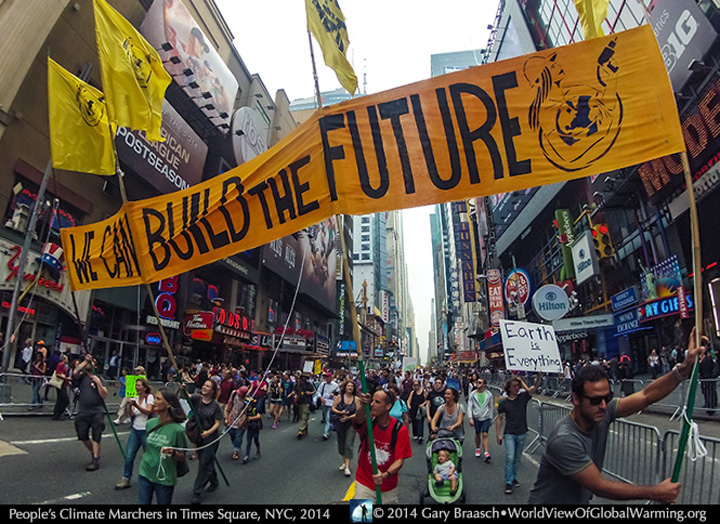Climate Photo of the Week
Released this week from the IPCC 5th Climate Assessment --
"Continued emission of greenhouse gases will cause further warming and long-lasting changes in all components of the climate system, increasing the likelihood of severe, pervasive and irreversible impacts for people and ecosystems. Limiting climate change would require substantial and sustained reductions in greenhouse gas emissions which, together with adaptation, can limit climate change risks."
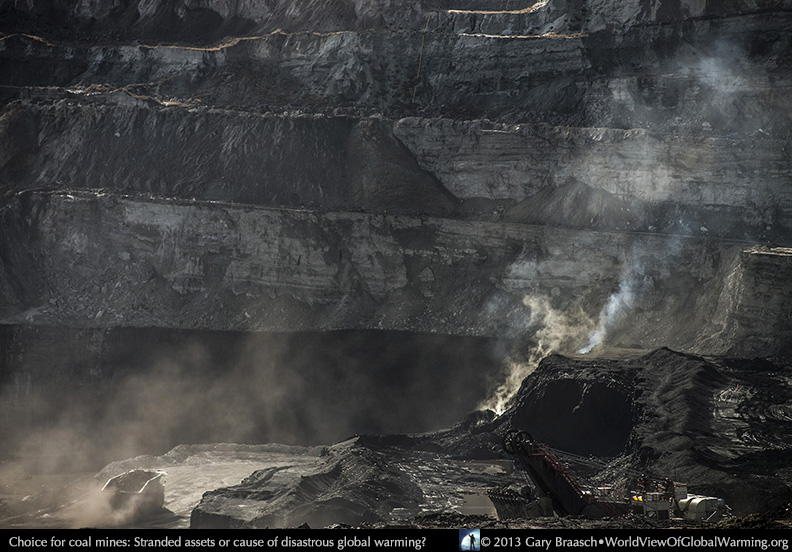
With these words and many other very powerful statements the Intergovernmental Panel on Climate Change presented a final combined wrap-up of its latest review of climate science on November 2. For the first time in its 26 year history the scientific advisory panel to the UN Framework Convention on Climate Change (UNFCCC) included detailed reports on the science of adapting to rapid shifts and methods of reducing carbon emissions ("mitigation"), including the economics of a great transition of the energy system away from fossil fuels. Those reports were issued throughout the past year. Key quotes from the final synthesis of the IPCC assessment include:
"There are multiple mitigation pathways that are likely to limit warming ...." said the final report synthesis. "These pathways would require substantial emissions reductions over the next few decades and near zero emissions of CO2 and other long-lived [greenhouse gases] by the end of the century. Implementing such reductions poses substantial technological, economic, social, and institutional challenges, which increase with delays...."
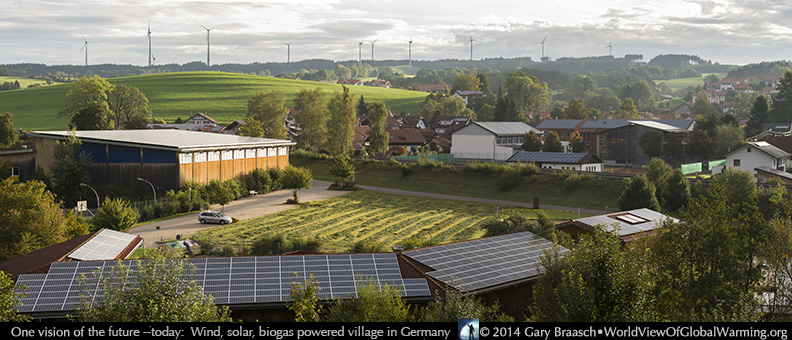
"Without additional mitigation efforts beyond those in place today, and even with adaptation, warming by the end of the 21st century will lead to high to very high risk of severe, widespread, and irreversible impacts globally. In most scenarios without additional mitigation efforts ... warming is more likely than not to exceed 4°C above pre-industrial levels by 2100. The risks associated with temperatures at or above 4°C include substantial species extinction, global and regional food insecurity, consequential constraints on common human activities, and limited potential for adaptation in some cases."
"Many aspects of climate change and associated impacts will continue for centuries, even if anthropogenic emissions of greenhouse gases are stopped. The risks of abrupt or irreversible changes increase as the magnitude of the warming increases."
4°C is 7.2°F above the world's average surface temperature in preindustrial times of the 19th century. More than three-quarters of climate warming is from carbon dioxide emitted by burning fossil fuels and industrial processes (with methane and agricultural practices making up the rest). At this point the world has warmed about .8°C or 1.4°F, and in recent international climate negotiations nations agreed to try to limit warming to under 2°C, 3.6°F, above preindustrial temperatures. According to the IPCC assessment, "about 1900 gigatonnes of CO2" -- 2 trillion tons -- "were emitted by 2011, leaving about 1000 gigatonnes to be consistent with this temperature goal." About half of emissions are absorbed by land and ocean (which becomes more acidic in the process) and the rest stays in the atmosphere, warming it. Currently there is about 400 parts per million of CO2 in the air; IPCC says the concentration will reach about 450 ppm with the additional 1000 gigatonnes of the gas. But the IPCC also says, "Estimated total fossil carbon reserves" -- gas, oil and coal in the ground -- "exceed this remaining amount by a factor of 4 to 7, with resources much larger still."
If we keep burning that fuel the way we have been, the Earth will be 6 degrees F or more hotter than now within 80 years.
The IPCC numbers say that we've used up two thirds of the "carbon budget" which will meet the agreed goal of less than 2°C heating, and we already are suffering disastrous effects of climate disruption worldwide now. Yet there is unabated use of and plans for extraction of fossil fuels. In 2011 annual CO2 emissions were 34.8 gigatonnes (38 billion tons); estimates are emissions will top 37 gigatonnes this year. At that rate per year the world will exceed the 1000 gigatonne limit in 30 years or less. According to the International Energy Agency (IEA), "more than $1.6 trillion was invested in 2013 in energy supply. .... The largest share of current investment, more than $1 trillion per year, is related to the extraction and transport of fossil fuels, oil refining and the construction of fossil fuel-fired power plants." In contrast, said the IEA, only about $380 billion was spent on energy efficiency and renewable energy.
Those "multiple mitigation pathways" the IPCC reports on that "require substantial emissions reductions over the next few decades" leading to zero emissions, are not being taken nearly enough yet -- and we remain on the superhighway to a ruinous heat level before century's end.Business observers ask whether energy companies must leave much of their potential wealth in the ground ("stranded assets") and corporate critics like Naomi Klein question if corporate capitalism is suitable for an equitable low-carbon world. Many peoples' hopes for a long-awaited breakthrough for mandatory government climate action were lifted on November 11 when the U.S. and China promised lower emissions and more low-carbon power (see above). This agreement may propel next year's UNFCCC international climate negotiations in Paris to set international limits on global warming, but so far what nations say they will do to limit carbon emissions falls far short of what is needed.
Major sections of the IPCC's Fifth Assessment Report were released throughout the past year. More than 2000 scientists from 154 countries took part in reviewing, writing reports about and editing assessments of the climate science, effects, and methods of mitigation. The IPCC was established by the United Nations Environment Programme (UNEP) and the World Meteorological Organization (WMO) in 1988 to provide the world with a clear scientific view on the current state of knowledge in climate change. News reports on the final release may be seen in NY TImes and BBC.
World View of Global Warming's 10 and 15 year repeat photography of science and glaciers in Peru and Europe. A preview of our latest work. Link
More images and a report about the climate march, which included large contingents from health, immigrant, labor, solutions and citizens groups of all ages, are published by the Yale Climate Connections. Even more photos of NYC climate events coming up on World View of Global Warming.

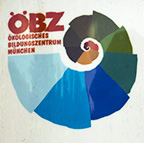 A new version of Gary Braasch's color print exhibition "Climate Change in Our World," curated and mounted for display throughout Europe, opened 16 September at the Ecological Education Centre, Munich Germany. Curated and organized by Maiken Winter, CEO of the NGO WissenLeben, the exhibit of large prints is supported and funded by the U.S. Consulate General in Munich, KIS GmbH software, TUM University School of Education, Meteodata and the insurance company Gothaer. We are grateful also to the printer, ALOE GmbH and for the collaboration of the Rachel Carson Center in Munich.
A new version of Gary Braasch's color print exhibition "Climate Change in Our World," curated and mounted for display throughout Europe, opened 16 September at the Ecological Education Centre, Munich Germany. Curated and organized by Maiken Winter, CEO of the NGO WissenLeben, the exhibit of large prints is supported and funded by the U.S. Consulate General in Munich, KIS GmbH software, TUM University School of Education, Meteodata and the insurance company Gothaer. We are grateful also to the printer, ALOE GmbH and for the collaboration of the Rachel Carson Center in Munich.
Images and captions are available here.
Locations documented by Gary Braasch in World View of Global Warming, 1999-2012
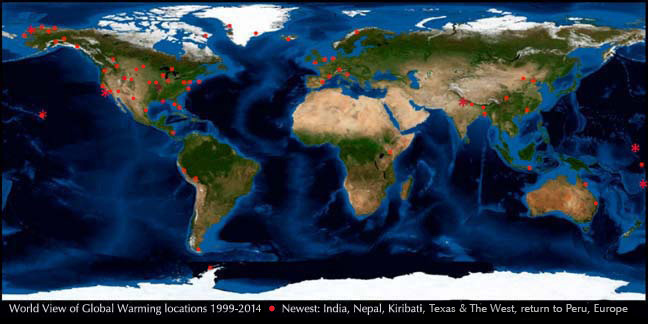
This project would be impossible without scientists and observers around the world who have provided hundreds of scientific contacts and papers. See Background, Advisors, and Reference for documentation, funders and major advisors, without whom I could not complete the work.
World View of Global Warming is a project of the Blue Earth Alliance, Seattle Washington, a 501(c)3 tax-exempt organization. The project is supported entirely by donations, grants, and license fees for the photographs. Please see information about how to contribute.
For other information about Gary Braasch's climate change projects and books, please see the books Earth Under Fire and How We Know What We Know About Our Changing Climate, and the exhibit "Climate Change in Our World" at the Books and Exhibits link on the top menu of this page.
COPYRIGHT NOTICE:
Photography and text Copyright © 2005 - 2017 (and before) Gary Braasch All rights reserved. Use of photographs in any manner without permission is prohibited by US copyright law. Photography is available for license to publications and other uses. Please contact requestinformation@worldviewofglobalwarming.org. View more of Gary Braasch's photography here.

